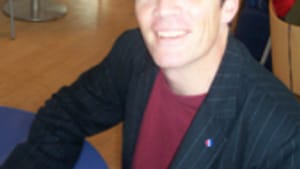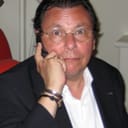Stay in the Loop
BSR publishes on a weekly schedule, with an email newsletter every Wednesday and Thursday morning. There’s no paywall, and subscribing is always free.
Corrupt but dedicated: Philadelphia's answer to Sherlock Holmes
Vidocq: Philadelphia's Sherlock Holmes

Every self-respecting city, it seems, claims association with some famous detective. London is famous for Sherlock Holmes, of 221B Baker Street. San Francisco has Sam Spade, as played by Humphrey Bogart. Who can visit Honolulu without thinking of Charlie Chan and His Number One son? Thanks to the author Lisa Scottoline, even Philadelphia has distaff private eyes like Marta Richter, Mary DiNunzio, and Bennie Rosato.
These legendary gumshoes, of course, share one thing in common: They're all fictitious characters. Yet surely there must be investigators who are both legendary and real. But who?
In Philadelphia, the answer may lie behind a smallish brass plaque— reading, enigmatically, just "Vidocq Society"— affixed to a townhouse not far from the Curtis Institute. There, at 1704 Locust Street, my Vidocq story begins.
Soon after I first spotted the sign, I got a phone call from a publicist with William Morrow in New York, who was flogging a new book: The Black Tower, by Louis Bayard. Would I do a review, perhaps?
I knew something about Bayard, a Washington-based book critic for Salon.com, and I agreed to give his novel a look-see. It was an open-and-shut case when the Morrow rep told me the book was a fictionalized account (are you ready for this?) of Eugène François Vidocq.
Vidocq? As in Society, perchance?
Drugged and mugged by a lady
"He was history's first detective," the publicist told me, with all the overconfidence of a freshman English major.
The Time: Early 19th Century. The Place: Paris.
Young Vidocq had stolen money from his father's bakery, and was preparing to abscond across the Atlantic to Philadelphia. But a complication arose, involving an equally young woman with whom Vidocq was traveling. When they wound up in the port city of Bordeaux, just before their ship was about to sail, she drugged, mugged and robbed him, leaving the callow Vidocq without a sou and the rest of his intriguing tale to history.
History as in Edgar Allan Poe and Victor Hugo, that is. My exuberant book flack went all Lit 101 on me. "Vidocq was the model for the Inspector in Poe's Murders in the Rue Morgue," she insisted. "And he inspired both Jean Valjean and Inspector Javert in Hugo's Les Misérables."
An Internet search provided more: Born in 1775, Vidocq was a reformed convict who founded, in 1812, the world's first police detective bureau: the SÓ»reté in Paris. He was profane, a brigand, a master of disguise, and a genius in the use of deduction— well before Sherlock— in tracking down the bad guys.
"Actually," the rep continued, "Louis will be in Philadelphia, and you can interview him."
On the dauphin's trail
The Black Tower is a quick, entertaining read. Bayard cleverly combines the myth of the living dauphin, the son and heir to the beheaded Louis XVI and Marie-Antoinette, with a mystery involving Vidocq. Is the dauphin actually alive? Has he returned to Paris? Author Bayard puts Vidocq— at times sympathetic, at times villainous— on the case.
I met Bayard at a stuffy reception at the Union League, sponsored by the Alliance Française. Tie-less, and in a navy, pinstriped sports coat, Bayard was as casual in demeanor as he was in dress. "You know," he was telling the group, "one of my early Huguenot ancestors was one of the first mayors of New York." (I checked: Mayor Nicholas Bayard, 1685-1686).
Later that evening, a friend introduced me to William L. Fleisher, ex-FBI special agent, ex-U.S. Customs agent, and an ex-Philadelphia cop who still looks like one. Where Bayard is a breezy 45-year-old writer, Fleisher is a portly (albeit dapper) 64-year-old private eye. A few days later I got together with Fleisher again on the second floor of 1704 Locust Street. That's right, at the Vidocq Society.
What, I asked, got him interested in Vidocq?
When victims had no rights
"I had this idea that a victim and his family were victimized over and over again," Fleisher said. "This was before victim's rights. The system was designed to beat up on victims. It just so happened that I was with Frank Bender [a colleague and friend] for lunch, and we were talking "'cold cases,' interesting cases. When we were done with lunch, I felt very intellectually stimulated.
"I was reading Modern Criminal Investigation, a book for police detectives, and I had learned about Vidocq. He was an interesting character, and no one had heard of him."
Fleisher and Bender decided to honor Vidocq by naming their new "cold case" club— inspired by that luncheon in 1990— after the Parisian detective. Almost 20 years later, the Society has 82 full members, plus about 50 "special" members around the world. Monthly club meetings are held in the Public Ledger Building. People come from everywhere.
Not surprisingly, given the club's mission, members are generally drawn from law enforcement, the legal business, and the forensic medicine field.
Still, why Vidocq?
The convict as risk-taker
"Vidocq, to me, is the symbol of redemption," Fleisher said, signaling what I sensed was something deep-seated in his own psyche. "Cons are risk-takers. Vidocq was the ultimate risk-taker. He was a very bright kid. A bad kid can become a good cop."
I had an early-morning coffee with Bayard, the author, just before he caught his train back to Washington. He cast Vidocq in much the same light.
"It was after reading Murders in the Rue Morgue that, for the first time, I heard his name," Bayard said. "The more I learned about him, the more I was intrigued. He was corrupt. But also dedicated to his work."
In the lapel of his navy-colored sports coat, the same one he had worn to the Union League, Bayard sported a Vidocq Society rosette. Voici, the newest member.
To read a response, click here.
These legendary gumshoes, of course, share one thing in common: They're all fictitious characters. Yet surely there must be investigators who are both legendary and real. But who?
In Philadelphia, the answer may lie behind a smallish brass plaque— reading, enigmatically, just "Vidocq Society"— affixed to a townhouse not far from the Curtis Institute. There, at 1704 Locust Street, my Vidocq story begins.
Soon after I first spotted the sign, I got a phone call from a publicist with William Morrow in New York, who was flogging a new book: The Black Tower, by Louis Bayard. Would I do a review, perhaps?
I knew something about Bayard, a Washington-based book critic for Salon.com, and I agreed to give his novel a look-see. It was an open-and-shut case when the Morrow rep told me the book was a fictionalized account (are you ready for this?) of Eugène François Vidocq.
Vidocq? As in Society, perchance?
Drugged and mugged by a lady
"He was history's first detective," the publicist told me, with all the overconfidence of a freshman English major.
The Time: Early 19th Century. The Place: Paris.
Young Vidocq had stolen money from his father's bakery, and was preparing to abscond across the Atlantic to Philadelphia. But a complication arose, involving an equally young woman with whom Vidocq was traveling. When they wound up in the port city of Bordeaux, just before their ship was about to sail, she drugged, mugged and robbed him, leaving the callow Vidocq without a sou and the rest of his intriguing tale to history.
History as in Edgar Allan Poe and Victor Hugo, that is. My exuberant book flack went all Lit 101 on me. "Vidocq was the model for the Inspector in Poe's Murders in the Rue Morgue," she insisted. "And he inspired both Jean Valjean and Inspector Javert in Hugo's Les Misérables."
An Internet search provided more: Born in 1775, Vidocq was a reformed convict who founded, in 1812, the world's first police detective bureau: the SÓ»reté in Paris. He was profane, a brigand, a master of disguise, and a genius in the use of deduction— well before Sherlock— in tracking down the bad guys.
"Actually," the rep continued, "Louis will be in Philadelphia, and you can interview him."
On the dauphin's trail
The Black Tower is a quick, entertaining read. Bayard cleverly combines the myth of the living dauphin, the son and heir to the beheaded Louis XVI and Marie-Antoinette, with a mystery involving Vidocq. Is the dauphin actually alive? Has he returned to Paris? Author Bayard puts Vidocq— at times sympathetic, at times villainous— on the case.
I met Bayard at a stuffy reception at the Union League, sponsored by the Alliance Française. Tie-less, and in a navy, pinstriped sports coat, Bayard was as casual in demeanor as he was in dress. "You know," he was telling the group, "one of my early Huguenot ancestors was one of the first mayors of New York." (I checked: Mayor Nicholas Bayard, 1685-1686).
Later that evening, a friend introduced me to William L. Fleisher, ex-FBI special agent, ex-U.S. Customs agent, and an ex-Philadelphia cop who still looks like one. Where Bayard is a breezy 45-year-old writer, Fleisher is a portly (albeit dapper) 64-year-old private eye. A few days later I got together with Fleisher again on the second floor of 1704 Locust Street. That's right, at the Vidocq Society.
What, I asked, got him interested in Vidocq?
When victims had no rights
"I had this idea that a victim and his family were victimized over and over again," Fleisher said. "This was before victim's rights. The system was designed to beat up on victims. It just so happened that I was with Frank Bender [a colleague and friend] for lunch, and we were talking "'cold cases,' interesting cases. When we were done with lunch, I felt very intellectually stimulated.
"I was reading Modern Criminal Investigation, a book for police detectives, and I had learned about Vidocq. He was an interesting character, and no one had heard of him."
Fleisher and Bender decided to honor Vidocq by naming their new "cold case" club— inspired by that luncheon in 1990— after the Parisian detective. Almost 20 years later, the Society has 82 full members, plus about 50 "special" members around the world. Monthly club meetings are held in the Public Ledger Building. People come from everywhere.
Not surprisingly, given the club's mission, members are generally drawn from law enforcement, the legal business, and the forensic medicine field.
Still, why Vidocq?
The convict as risk-taker
"Vidocq, to me, is the symbol of redemption," Fleisher said, signaling what I sensed was something deep-seated in his own psyche. "Cons are risk-takers. Vidocq was the ultimate risk-taker. He was a very bright kid. A bad kid can become a good cop."
I had an early-morning coffee with Bayard, the author, just before he caught his train back to Washington. He cast Vidocq in much the same light.
"It was after reading Murders in the Rue Morgue that, for the first time, I heard his name," Bayard said. "The more I learned about him, the more I was intrigued. He was corrupt. But also dedicated to his work."
In the lapel of his navy-colored sports coat, the same one he had worn to the Union League, Bayard sported a Vidocq Society rosette. Voici, the newest member.
To read a response, click here.
What, When, Where
The Black Tower. By Louis Bayard. William Morrow, 352 pages; $24.95. www.louisbayard.com
Sign up for our newsletter
All of the week's new articles, all in one place. Sign up for the free weekly BSR newsletters, and don't miss a conversation.

 Richard Carreño
Richard Carreño